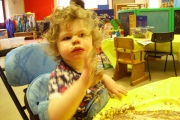|
Pre School Sessions
Monday 9.00-12.00 noon
Tuesday 9.00-12.00 noon
Wednesday 9.00-12.00 noon
Thursday 9.00-12.00 noon
Thursday 1.00- 2.30 p.m
Friday 9.00-12.00 noon
Very young children learn through their play and this is the most effective way for them to learn because it is what they want to do. We structure each child's play to help them to explore and discover and make sure that they are gaining something from their experiences. Some children will need very careful step by step help, others will need help with specific
areas such as developing listening skills, language skills or taking turns with other children. They may need help in organising their body to enable them to play, perhaps needing specially adapted equipment.
Our play experiences are based on the Early Years Foundation Stage statutory framework, which is used in all funded nurseries, preschool and reception classes. The EYFS is for all children from birth to five and the overarching aim is to help each child to achieve the five Every Child Matters outcomes: be healthy; stay safe; enjoy and achieve; make a positive contribution; achieve economic well being.
The EYFS has four very important principles
Every child is a competent learner from birth who can be resilient, capable, confident and self-assured
Children learn to be strong and independent from a base of loving and secure relationships with parents and/or a key person
The environment plays a key role in supporting and extending children’s development and learning
Children develop and learn in different ways and at different rates and all areas of learning are equally important and interconnected
How a session might look:
|
Welcome children and parents |
|
Parents help children to find photo of themselves and hang up cat and name card on the coat hooks |
|
Children arrive by bus. |
|
Free choice play –inside and out—lots of activities that look fun! |
|
At least one adult-led activity such as cooking. |
|
Music signals tidy away time—everyone encouraged to help. |
|
Nappy changing, reminder to go to the toilet (if you haven’t already) hands washed. (only staff change children’s nappies) |
|
Children return to key worker tables, find their own name, share books with a student or volunteer. |
|
Snack time—choice of drinks and fruit or another healthy snack—all used as an opportunity to communicate |
|
Children play outside using the climbing frame, cars and bikes, balls, trampette, etc |
|
Back in to Main Playroom for story, music making or singing. |
|
Sing goodbye and children are taken out individually to meet up with parents or to go home by minibus. |
During any of this time a child may be taken for individual targeted activities with his key worker, our teacher or a therapist.
These activities could involve physiotherapy or occupational targets, speech therapy targets or targets which we have included in an individual education plan . This education plan will always be drawn up in consultation with parents.
Children in the group will be encouraged to gain confidence and independence through making their own decisions, doing things for themselves and having their own work and feelings valued. When children bring art work home it will be their own, not the result of a well meaning adult's intervention! This art work is a child's early exploration of the materials involved. Each child will be encouraged to strive for independence. This may mean that we do not always rush to help. Having help may be comfortable but being able to do things for yourself is an achievement.
Yeovil Opportunity Group has been chosen as one of just 18 nurseries in the country to become a centre for the PLAY AT I.T. project – bringing Information Technology to children with disabilities. The PLAY AT I.T. project is funded by the National Lottery. The project has provided us with a touch screen computer, lots of appropriate software, camcorder, switches, communication aids and training, enabling every child, whatever their disability to get involved with technology. I.T. is important for all of us, and it’s inevitably going to be central for our children and we want them to develop competence and confidence in this important area.
|


|